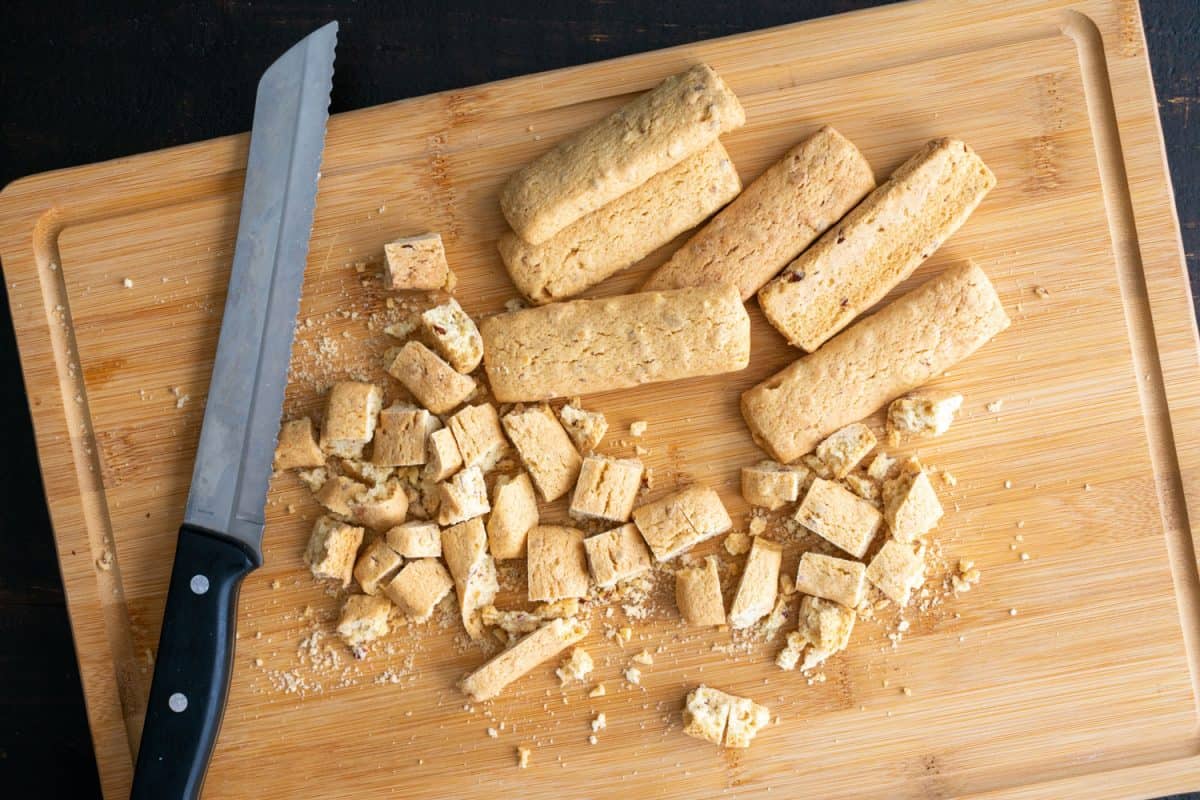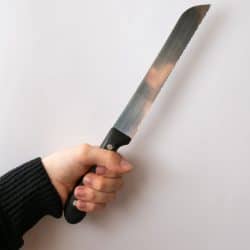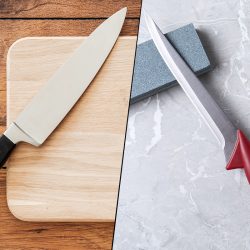Knife sets come with a wide variety of different knives. One of the bigger knives in the set that easily stands apart from the rest is the bread knife. This knife is fantastic at doing its job! After slicing through a loaf with it, however, you may find yourself wondering if it has to be washed? You might also wonder what other cleaning steps are needed for your knife. We have researched for you to find the proper way to care for your bread knife!
While simply wiping the crumbs off your bread knife may do the job, the best practice is to wash it properly. To do this, you have to hand wash your knife and avoid the dishwasher. Also, make sure to dry and store it properly. Keeping your bread knife at the top of its game may also involve sharpening it. Depending on the environment you live in, you might also want to oil your blade.
That might seem like a lot to properly care for one simple knife. However, the payoff for taking all of these careful steps is worth it! We know the value of correctly taking care of an item so that it can last a long time. This means that your bread knife will be effectively doing its job for you for years to come! Before you run off to bake some delicious bread so you can try out your knife, there may be some more information you need. Make sure to keep reading below, so your bread knife stays in tip-top condition!
![Sliced fresh bread with dates and bread knife, Do You Need To Wash A Knife After Cutting Bread? [And Other Care Tips For Bread Knife]](https://kitchenseer.com/wp-content/uploads/2021/06/Do-You-Need-To-Wash-A-Knife-After-Cutting-Bread-And-Other-Care-Tips-For-Bread-Knife.png)
How To Wash And Care For Your Bread Knife
While your first instinct might be to put your bread knife into the dishwasher and then toss it into a draw, that's not the best way to go about it. This simple method of care might be easier, but it will also take time off of your knife's lifespan. Taking a little more time and being deliberate with how you care for your knife will keep it slicing for a long time.
How Do I Clean And Sanitize A Bread Knife?
After your done cutting through a loaf with your bread knife, you'll want to hand wash it. Putting your bread knife in the dishwasher has a high chance of damaging it. Your knife will get jolted around a bit in the dishwasher, which can easily damage to blade and dull it. Letting it sit in the water with dishwashing chemicals is also detrimental for the blade.
The best practice is to hand wash your bread knife with warm water and soap. Do not let your knife sit submerged in water. Once it's clean, you'll want to carefully pat it dry with a clean towel or paper towels. If your knife has any stains on it, your first instinct may be to scrub away at it, which can also damage the blade. Try using a lemon cut in half! Rub the halved lemon on the blade. The acidity from the lemon is excellent for safely removing stains!
Where Do You Store Bread Knives?

There are different methods for storing all of your knives, but some are certainly better than others. One common practice that should be avoided is setting it loosely in a drawer with many other utensils and kitchen tools. This method can easily damage your bread knife and dull it as it bangs against everything else in the drawer.
The two best methods for storing your bread knife are in a wooden knife block or on a magnetic strip on the wall. Wooden knife blocks are a traditional way of storing your knives. However, over time the blade sitting against the wood may dull it. Also, if your blade isn't completely dry, then the knife block will seal in the moisture and cause problems. The best method is to install a magnetic wall strip. This way, you can hang your knife vertically. Nothing will butt up against the blade, and any leftover moisture will dry naturally!
Do Bread Knives Need Sharpening?
Eventually, every knife will need to be sharpened. Sharpening your bread knife once in a while will make sure that it can adequately slice. If you continue to use it as it dulls, you will notice unwanted effects on the food you are cutting. This can be jagged lines or uneven cutting.
Since bread knife blades are so different from other knives, you must be careful how you sharpen them. While most knife kits come with some form of sharpener, it's unlikely that it will work for your bread knife. The serrated blade needs a particular type of sharpener. Otherwise, it will be damaged. Getting a serrated blade sharpener is the best way to keep your bread knife in its best shape!
Click here to shop for serrated knife sharpeners on Amazon!
Does Cutting Bread Dull A Knife?
Cutting soft bread on its own will not dull your bread knife. At least not for quite some time. The tiny teeth on the blade do most of the work and help stop any dulling from happening for a very long time. That said, you most likely aren't just using your knife for soft bread. Cutting harder types of bread or stale bread will dull your blade quicker. If you use your bread knife on other foods, that will also help to dull it over time.
Do You Need To Oil Your Bread Knife?
For best practice, you may want to oil your bread knife from time to time. This will help protect the blade from moisture in the air as well as other debris. To do this, first, make sure that your blade is clean and completely dry. Then apply a small amount of food-grade mineral oil to the blade and spread it evenly across it with a clean cloth. After it is oiled, make sure to properly store it, whether on a magnetic strip or in a knife block.
Shop for food-grade mineral oil on Amazon!
How Else Can You Use A Bread Knife?
You might be tempted to use whatever knife is handy to cut everything. After all, all knives are designed to cut food, right? While this is true, there's also a reason that there are differently shaped knives. Each is designed specific type of food the best. The serrated and large blade on a bread knife makes it perfect for slicing through bread, along with other things. Here are all of the things that a bread knife can be used to cut!
All Of The Bread
While it might seem obvious, it's easy to forget just how many types of bread there are. Bread knives are great for slicing a loaf of bread, but what about baguettes? There are also bagels, biscuits, and ciabatta! No matter what shape or density to bread comes in, a bread knife can make short work of it. Just make sure to use the knife properly by cutting vertically for even slicing.
Fruits And Vegetables
The serrated blade on this knife makes it able to handle bigger jobs than just bread. Bread knives are also great at sawing through fruits and vegetables! Many fruits and vegetables have tough skins or rinds that make it hard to get through with a regular knife cleanly. It can take much less effort if you use a bread knife. Just be sure to properly clean the knife when you have finished using it so that the acids of the fruits don't sit on the blade.
Don't Forget About Dessert
Bread knives also make quick work of desserts! While the serrated blade may not be essential for many desserts, that doesn't mean it won't make the work easier! Many cakes also have a denser structure that a bread knife is great for cutting through. Hard crusts on pies will also be cut easily by this knife. As a bonus, you can even use the long even structure of this knife's blade to spread frosting and creams!
Best Practices
![Sliced fresh bread with dates and bread knife, Do You Need To Wash A Knife After Cutting Bread? [And Other Care Tips For Bread Knife]](https://kitchenseer.com/wp-content/uploads/2021/06/Sliced-fresh-bread-with-dates-and-bread-knife-1200x800.jpg)
To make sure your bread knife stays at its best for as long as possible, make sure you properly clean it after each use. Wiping the crumbs off of the blade with a cloth may seem to do the trick, but you should always be better safe than sorry around food. Hand wash your bread knife with warm water and soap, and do not let it stay submerged in water. Dry it off completely, and then store it properly in a wooden knife block or, better yet, on a magnetic strip. Now that you know more about your bread knife, it will keep doing its job for even longer!
For more knife know-how, make sure to click on the links below!
How Often To Sharpen Kitchen Knives?
Can You Put Kitchen Knives in the Trash?
What are Shun Knives Made of (And Do They Rust)?
7 Types of Chef Knives You Should Know







![set of cheese knives on a round wooden board. 14 Types Of Cheese Knives [Inc. What Cheese They're Good For And Why]](https://kitchenseer.com/wp-content/uploads/2021/07/set-of-cheese-knives-on-a-round-wooden-board.-14-Types-Of-Cheese-Knives-Inc.-What-Cheese-Theyre-Good-For-And-Why-250x250.png)
